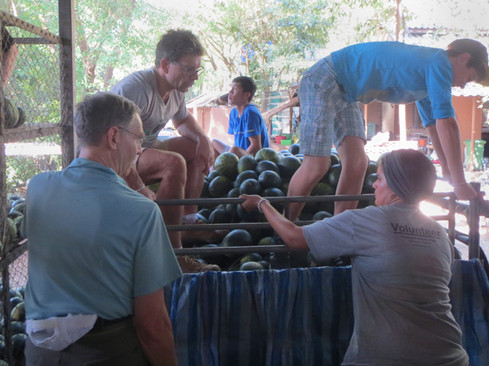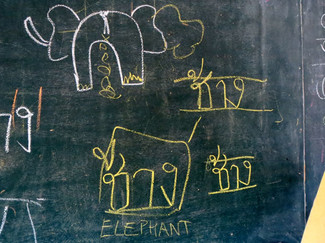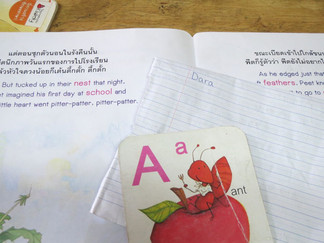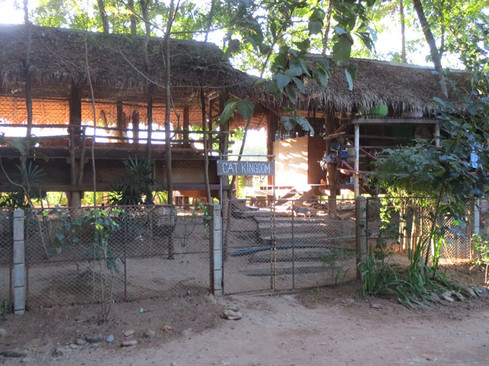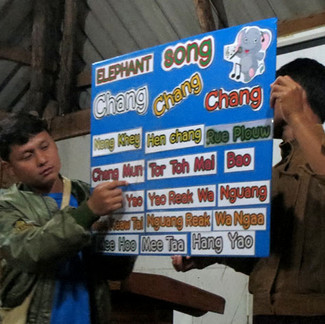Elephant Nature Park - Week Long Volunteer Program Guide & Review
- Dara
- Feb 3, 2025
- 25 min read
Updated: May 17, 2025
The week I spent volunteering at Elephant Nature Park in northern Thailand was one of the great experiences of my life. I remembered stumbling across an article on the place in the newspaper, sometime in the late aughts. I bookmarked it, then went back to what I was doing at work. I was always reading up on interesting things to do abroad, but knew immediately in my heart that this was one I was going to follow through on. It did take me quite a few more years to put the plan into action, but I eventually booked a trip to Thailand specifically to volunteer at ENP.

If you’re interested in ethical elephant experiences, learning about animal welfare and conservation, and positively impactful volontourism in Thailand, then Elephant Nature Park is one of the best places to visit. They are world renowned for the incredible advocacy, rescue, and rehabilitation work they do on behalf of the asian elephant. This is my review and guide on their week long volunteer program, including what to expect while you’re there, what you’ll do, what you’ll learn, and why this experience is worth flying halfway across the world for.

I also have a short video review of my week at ENP, if you’d like to see more of the elephants and what the park grounds are like. Video link will be at the bottom of the post as well!
Elephant Nature Park Volunteer Guide - Table of Contents
About Elephant Nature Park
Elephant Nature Park is an elephant rescue and rehabilitation sanctuary in northern Thailand’s Mae Taeng valley. It’s about 40 miles (65 km) from the country’s second largest city, Chiang Mai. ENP’s founder, Lek Chailert, started rescuing elephants from abusive conditions in the 1990s, and the sanctuary was formally established in 2003 as their permanent home. Elephant Nature Park is supported by Lek’s Save Elephant Foundation, a Thai non-profit that works tirelessly to protect these magnificent animals.

ENP is home to elephants who have been rescued from logging camps, street begging, tourist riding camps, and circus shows. The elephants who live here often arrive with physical injuries, permanent deformities and disabilities, and deep psychological wounds - some which never quite heal. Elephant Nature Park is a place for them to live out their lives in the most natural way possible, with the medical care, peace, respect, and dignity that they deserve. The elephants at ENP always come first. As visitors and volunteers, we are here to support them - they are not here to entertain us.

ENP is also home to many other rescued animals as well! There are herds of water buffalo throughout the grounds, along with hundreds of rescued cats and dogs. Some are kept in specific areas, while some are free roaming. Many have special medical needs, and all are well looked after. This is their home too, and from what I saw, all species manage to live in harmony quite well together!

About Lek Chailert, Elephant Nature Park's Founder
Saengduean ‘Lek’ Chailert is the very definition of small but mighty. She’s an award-winning conservationist who has dedicated her entire life to improving the lives and treatment of asian elephants. I wanted to highlight her specifically, because what she has accomplished on behalf of elephants in this part of the world is nothing short of extraordinary. I encourage you to take a few moments to read her biography on the Save Elephant Foundation page.

To this day, when I face a challenge that seems utterly impossible, I think of this woman and what she has managed to achieve in the face of insurmountable odds. She is a true example of perseverance and unwieldy dedication to fighting for those who do not have a voice - a real badass woman!
Other Elephant Experiences - What's Ethical?
Elephant activities are very popular for tourists in Thailand, but places vary greatly in their goals, priorities, and treatment of the animals. There are absolutely other sanctuaries and camps in Thailand besides ENP who do great work, but sometimes telling the good places from the bad isn’t easy, so it’s important to do your research and know what to look out for. There are plenty of “sanctuaries” in Thailand who may look ethical on the surface, but do not have the elephants’ well being at the forefront of their operations.

A few things to look out for, if you can’t make it up to Chiang Mai to visit ENP:
Chains
ENP’s female residents live in herds, socialize, and roam the grounds as they please during the day. They return to their well-equipped enclosures only at night, for safety, additional feeding, and any treatments. The elephants choose their friends and have complex emotional lives and social structures, much like people. Bulls are given their own individual spaces to roam as well, though they cannot meander around the park freely, for obvious reasons :-). There are no chains at Elephant Nature Park. Elephants get to know their individual mahouts (the keeper assigned to watch over the elephant(s)) and will walk with them when they need to move around. Any sanctuary that uses chains, whether on the feet or neck, is not ethical.

Entertainment
Do elephants at this camp balance on an object for your amusement? What about painting you a picture with their trunks? 100% unethical. One of the more difficult things you’ll learn about at ENP is the phajaan process. Phajaan means “crushing” in Thai. It is essentially the process by which the elephant’s spirit is broken, and they become tame; a pliable creature who has given up and will bend to the will of the human to perform as instructed.

To be honest, learning about the phajaan process was one of the most upsetting things I’ve ever been exposed to. Some of the footage I watched still haunts me to this day. I won’t go into further detail here, as this is something ENP should teach you about, and it is quite a triggering topic, so I’m sure you get the gist. Besides the fact that an elephant painting a picture is a completely unnatural behavior that only exists for our entertainment, any elephant you see performing any kind of trick has undergone the phajaan process. Keep that in mind when looking at potential elephant experiences in Thailand.

Riding
Elephants are so big! Surely a human or two on top won’t hurt? Even if there’s no huge seat, and it’s just bareback riding? No. Despite a long history of being ridden by humans, elephants are not physiologically suited for this. Their large size is quite misleading, as their backs are actually relatively weak for their stature and are not structured for weight bearing. Any camp or sanctuary that allows riding is not ethical and does not have the animals' welfare at heart. No exceptions. Many places will try to convince you otherwise. Don’t fall for it. Also, if an elephant is trained to carry riders, it has undergone the phajaan process. I’ll leave it at that.

Bathing and Physical Touch
If you watch my video on my time at ENP, you’ll see that back when I visited we were permitted to bathe the elephants in the river. We were also allowed to touch the elephants who didn’t mind the physical human attention. Elephants who were not interested or afraid were never forced to come near us, but there were a few who didn’t mind the gentle pats. ENP has since changed their policy on both of these things, in an effort to give the elephants a more natural way of life. You can still feed them and get pretty close, but no more bathing or physically touching. Even ENP is always working to better itself, and I appreciate an organization that would actually take fun activity options away from tourists in order to give the animals a more natural experience.

The Asian Elephant Projects website is a great resource to learn about other ethical elephant experiences in Thailand and throughout Southeast Asia, who keep elephant health, happiness, and welfare as their top priorities. I'd recommend participating in one of their vetted programs if you can, so you know you're not supporting anything harmful.

Location
Elephant Nature Park is located about 40 miles (65 km) north of Chiang Mai, on 250 acres of misty Mae Taeng landscape.

I flew directly into Chiang Mai when I arrived in Thailand, and the city itself is absolutely worth spending a few days in to check out. It’s the perfect size for exploring on foot, with lots to see, do, and eat. I found Bangkok to be a bit chaotic and overwhelming, but Chiang Mai is one of those places I could return to over and over again.
Elephant Nature Park does have an office in the Chiang Mai city center as well, and that’s where you’ll start your journey to the park.
Logistics
The week long volunteer program runs all year round and is very popular! Advance bookings are essential, especially if you want to come during the high season, which runs roughly November - February. Spots can be reserved online, and I’d recommend securing your place as soon as you know when you’d like to go - popular weeks can sometimes fill up a year in advance! A deposit is required to secure your spot, then the remainder is paid once you get to the ENP office. Also keep in mind that June - October is the rainy season, so be prepared to get a bit wet if you visit during these months!

I’ll mention here that the week long program is not the only way to visit Elephant Nature Park. If you can’t spend a full week here (though I do really think this is the best way to truly experience this place), they offer half day, full day and overnight options as well. They also have off-site programs, one of which I did about a year after my week at ENP - Journey to Freedom. I’ll do a future post on the details of that experience, but I do have a video on it if you’d like to check that out! Link will also be at the bottom of the post.

Volunteering is open to anyone ages 12 and up, though children or teens volunteering must be accompanied by a legal guardian.
There are no fitness requirements, but you will be doing physical work so a good level of general health and fitness is recommended.
Luggage allowance is listed as one standard check-in size bag and one small day pack per person. I don’t think they really enforce this one too hard, but if you have a lot of luggage with you, it might be easier to just take what you need and store the extra bags in Chiang Mai until you return, if possible.

The week long volunteer program starts at 9 am Mondays at the city center ENP office and you’ll arrive back in Chiang Mai around 3:30 pm the following Sunday. Transportation to and from the park is included.
The ENP office is where you sign in, pay any balance you owe (full section on cost at the end of the post), choose your t-shirt size, and take care of any last minute questions or needs before leaving the city.

They do also offer hotel pickups, but there may be extra charges depending on where your hotel is located. I’d recommend staying within the Chiang Mai center ring road anyway, which makes the ENP office easy to get to - most people for my volunteer week made their own way to the office.
Once everyone is set, you’ll make the 90 minute drive in small passenger vans to the sanctuary. This is where they typically play the video where you will learn about the challenges facing the asian elephant, along with the phajaan process I mentioned above. By the time you arrive at the sanctuary, you’ll already be eager to get started on working toward doing some good.
What Is Provided
Transportation to Elephant Nature Park from Chiang Mai and the return trip
Shared accommodation on site (full accommodation section here )
3 vegan meals a day (full food section here)
Wifi is in the common areas, but it is very hit or miss - don’t rely on it
Elephant Nature Park T-shirt
Reusable water bottle (not great quality, recommend bringing your own) and an over the shoulder sling bag for it - The sling bag was very useful to have when walking around the park. I actually ended up keeping it and putting it up on the wall of my apartment as a reminder of my trip :-)

Useful on site and as a souvenir!
What to Pack / Have
Make sure you've got everything on the list!
Clothes
Bring ones you don’t mind getting dirty - this definitely isn’t a place to dress up. We’ll get into the types of tasks you’ll be doing in a bit, but you’ll want to wear warm weather clothing you’ll be comfortable doing outdoor work in. I mostly wore loose running shorts and cheap t-shirts.

Make sure you have at least one long sleeved shirt and pair of long pants as well. You’ll be in the mountains, so even when it's warm during the day, the temperatures do drop at night. Long sleeves and pants are also important to have since there are some work assignments (like the grass cutting) that you’ll want to have your skin covered for. A light jacket can be nice to have too, for those chilly evenings and early mornings. If you’re here during the wet season (June - October), a rain jacket or poncho may come in handy as well.
Footwear
Closed-toed, supportive shoes for work tasks are essential. You’ll spend a lot of time on your feet and the park is big! Some work tasks take a while to get to if they’re located away from the main platform area (that's the hub of the park, also where volunteer accommodation, meals, and meetings are).

Flip flops or any open-toed shoes are a bad idea for while you’re working. While taking an ill-advised shortcut one day, I nearly tripped into some barbed wire that was on the ground behind a utility shed - so always have your feet covered! I wore an older pair of sneakers that I didn’t mind getting a bit beat up. A second lighter pair of shoes or flip flops can be nice to change into at the end of the work assignments, once you’re sticking to just the accommodation and main platform areas for the rest of the day.

It’s nice to have something else to put on your feet if your work shoes are dirty, and I always prefer to have flip flops on hand for the shower as well. If you’re here during the wet season (June - October), rubber boots might be helpful to have too.
Sun Protection
A hat, sunglasses, and sunscreen are a must! Some volunteer tasks are out of the sun, but many are not, so be prepared! You don’t want to miss out on anything because of a headache or a bad sunburn.

Refillable Water Bottle
As I mentioned above, they do provide one, but it’s not going to be high quality. Mine was very leaky. Best to bring your own, and leave theirs for someone else who didn’t bring one. Saves on plastic waste as well!
Gardening Gloves
These are very useful for the tasks where your hands will get dirty or potentially scratched up.
Flashlight or Head Lamp
Even the public areas of the park (accommodation buildings & main platform area) get very dark after the sun goes down. You’ll need your own light to get around safely and avoid tripping hazards. You can always use your phone of course, but I’m a big fan of hands-free head lamps!

Insect Repellent
Thai mosquitoes and flies have no mercy. Get the strongest stuff you can find for any exposed skin, especially if you’re prone to getting bitten up like me!
I also pre-treated my clothes with permethrin spray before I left for Thailand, to avoid getting bitten through my clothing too.

Towel & Toiletries
These are not provided, so be sure to bring your own. ENP does have towels you can rent in a pinch, but serving as a hotel isn’t their main priority, so don't expect amentities. More on accommodation in a bit.
Extra Blanket
If you’re here in the winter and you get cold easily, you may want to bring an extra blanket for comfort. A lot of hostels don’t allow sleeping bags on their beds for bed bug/hygiene concerns, but you can use them at ENP if you’re traveling with one.
Earplugs
You’re going to be sleeping on site with hundred of animals right outside your door - which is amazing, but can have its downsides too. The elephants can be chatty at night as they call to each other, and while it’s beautiful and heartwarming to hear them, it can make falling asleep tough! The dogs can also be noisy - imagine a hundred plus dogs all barking at once. If you’re a sensitive sleeper like I am, you’ll want earplugs to tune out the cacophony of voices that can erupt at any hour.

Extra Cash
You’ll want some extra Thai baht on hand for the snack/drink shop. You can buy things like cookies, chips, soft drinks, or beers. There’s also a small shop on site to purchase locally made handicrafts, which make for nice mementos and are a great way to contribute to the local economy.

Most of my cash went to the massage ladies though. They have mats set up on the second floor of the main platform where you can get absolutely amazing Thai massages at very reasonable prices.
Extra Snacks
I am a snacker, and I like to have my own food on hand for when the mood strikes. While you can buy a couple of things at the snack shop, if you have something specific that you like to nosh on, stock up in Chiang Mai before you start the volunteer week.

Books or Other Non-Internet Entertainment
You’re here to volunteer, but also to learn, meet other like-minded travelers, and to have a good time - you won’t be worked to the bone! There will be plenty of down time during your volunteer week, and I’ll touch more on the typical daily schedule shortly. ENP does organize some activities, but it might be a good idea to have some books, playing cards, or games on hand to keep you busy during the unscheduled time slots, particularly in the evenings after dinner.

Accommodation
ENP’s accommodation is rustic but comfortable. Rooms are shared, with 2 - 3 volunteers in each. If you’re traveling solo, you’ll be paired up with other solo volunteers.

There were a ton of solo travelers in my group. Thailand is a very popular place for people to explore on their own, so don’t worry about signing up to volunteer for the week if you’re by yourself. You’ll be surrounded by other like-minded travelers and will make friends quickly! I was a solo traveler and made a couple of wonderful friends here that I am still in touch with today.

Rooms can be in cabins or slightly larger “motel style” buildings.

Everyone gets a twin-sized bed with blankets and a mosquito net. Restrooms are shared and are always found nearby, with western-style toilets. The overall quality of the bathroom can vary depending on which accommodation building you are in, and hot water can be hit or miss. This isn’t a 5 star hotel, so expect basic restroom facilities.

The best part of the accommodations at ENP though is that sometimes you can make friends with the local residents, and bring in an additional roommate for the week!

Food
The food at Elephant Nature Park is vegan - it was my first time in life going vegan for a full week! Don’t let this put you off if you’re a meat-eater though - the food here is very good, and there is a ton of variety. Everything is buffet style, with a wide array of delicious Thai and western style dishes to suit all palates. Lots of tofu of course, but you’ll also find plenty of pastas, noodles, rice, breads, potatoes, and vegetables to keep you satisfied and full of energy for all the volunteering work.

Water, coffee, and tea is provided, and as mentioned above, you can also purchase your own drinks from the snack shop.
Meals are served 3 times a day at the main platform. Breakfast starts at 7 a.m., lunch is at 11:30 a.m., and dinner at 6 p.m.

Meet the Herd of Elephant Nature Park!
Once you arrive at ENP, your guides will introduce you to many members of the herd. The ENP guides are incredibly knowledgeable on the elephants who reside here, and you’ll really be able to get to know the individual stories of many of the residents. Elephants are extraordinarily intelligent and sentient creatures. You’ll learn about the family groups they’ve formed at ENP, their personalities, and their backstories.

Be prepared, some of these stories will be difficult to hear. Many of the things these animals have been forced to endure in their lives go beyond cruelty. As upsetting as it may be to hear some of these backstories, it is also critically important to know what these animals are facing. You come to ENP to donate your time, to learn, and of course, to see magnificent elephants up close - but one of the most important roles you’ll have as a volunteer is the one you play after you go home. The role you’ll carry with you for the rest of your life - that of a knowledgable elephant welfare advocate.

Many of the elephants have their own online profiles! If you want to read up on some of them ahead of time, you can visit ENP’s elephant profile page. It’s a great way to start learning before you arrive, and also to start getting a sense of the conditions these animals face and why places like ENP are working so hard to change the status quo.
Typical Volunteer Day - Schedule, Assignments & Work Tasks
On your arrival day you’ll get to the park in time for lunch service, and then you’ll get settled into your accommodations. If you’re traveling with friends or family you’ll be placed together, and solo travelers are paired up with each other. The full roster number of people volunteering for the week can hover from 40 - 80. You’ll be broken down into 4 smaller groups (A, B, C & D), and those will be your work groups for the week.

A typical volunteer schedule for the day is breakfast, first work period, lunch, second work period, and then dinner. You will have plenty of free time though. The volunteer work itself on average only covers about 4 - 5 hours a day. Each “shift” isn’t terribly long, with one exception that I’ll mention below.

The day starts with the breakfast buffet at 7 am, so things do start early here. All meals are held in the dining section of the main platform area, the hub of ENP.

After breakfast you’ll head to the nearby designated meeting point, where there will be a whiteboard with the details on which group is doing which task for the day. Your guides will meet you there and brief you on any details you need to know. There’s typically 1-2 guides per group per work period, and you’ll likely get to spend time with all of them throughout the course of the week. They’re all local Thai people who speak English, have been trained as tourist guides, and have a wealth of information and love for the elephants. They also do a phenomenal job at keeping things light and fun!

The morning work period starts around 8 or 8:30 am, and then you’ll have a break for lunch, which is served at 11:30 am. The afternoon work period starts around 1 or 1:30 pm, and then you’ll have a break until dinner. Each work period isn’t more than 2 or 2 1/2 hours. There’s typically down time before lunch, after lunch, after the afternoon work period, and in the evenings after dinner. In the event you aren’t feeling well or need a break, you can also skip a work period - nobody is going to force you to do anything.
Now onto the million bhat question - what kind of volunteer work will you be doing at Elephant Nature Park???

As you can imagine, a 250 acre property filled with hundreds of elephants, water buffalo, cats, and dogs (plus various other kinds of animal rescues as well!) generates a very long daily to-do list!
I was not expecting there to be so many water buffalo living at ENP!
There are also a few volunteer enrichment activities that take place during some of the work periods too. Your assignments can include:
Elephant Kitchen Duty
This is a big one, and you’ll likely be scheduled here a few times to do different kinds of things. A single elephant can eat 150 - 200 kg (330 - 440 lbs) of food per day and Elephant Nature Park has 70+ of them, so you can do the math! The elephant kitchen area is a big open space located on the main platform.

It’s constantly being emptied and refilled to satisfy those elephant-sized appetites, so there is always something to do here.
Clockwise, from upper left: Banana storage in the elephant kitchen; Cut up watermelons ready for delivery to the elephants; The kitchen all stocked and organized; Large rice cookers over coals
On different shifts my group washed vegetables, helped cut up food, unloaded trucks and organized the incoming food onto the storage shelves, and made rice balls, which were popular for the older elephants with dental issues to eat.
Clockwise, from upper left: A completed rice ball; A fully loaded watermelon truck arriving at the kitchen; Stirring rice to prepare for the balls; Volunteers unloading the watermelons
You’ll also help bring the food out to the elephants roaming freely in the park, and may get to feed them! Feeding is still allowed, although as mentioned earlier, touching them or “petting" is not.

Scooping Elephant Poo
The elephants have sleeping enclosures that they return to at night. Every morning these enclosures need to be cleaned up. What goes in must come out, right? I actually didn’t mind this task! You’re given shovels and wheelbarrows to complete the work - definitely bring your gardening gloves as well, if you brought a pair!
Left: Me scooping a mountain of poop, and Right: Slowly filling the wheelbarrow
Cleaning & Maintenance Tasks
There are a ton of buildings and facilities on site, so there’s always something that needs cleaning. One of our maintenance tasks was cleaning out these water tanks. We were given long brushes and got right on in!
Left: A fellow volunteer and I posing with our brush and broom before starting
Right: Getting down into the bottom of the tank for cleaning
Fence / Barrier Building
You’ll see these short stone columns throughout the property. They’re used to keep elephants out of areas they shouldn’t be in, and many are volunteer made! The stones are sourced from the river that runs through the property, and then mixed with cement. Voila! An easy, hand-made elephant safety barrier.

Elephant Walk
Each group gets a designated shift that is essentially an in-depth tour of the whole park. Your guide will take you around the grounds, telling you all the backstories of the elephants -how they were rescued and from where, what kind of help they’ve gotten here, what their personalities are like, their quirks, their favorite foods, etc. This is where you’ll really get to know the residents of ENP.

You’ll learn all about elephant behavior, how they adapt when they’ve arrived at the park, and how they form new bonds and families once they realize they’re safe. You’ll learn about their physical and psychological scars, and what the park and veterinary staff does to keep them as healthy and as comfortable as they can be going forward.

You’ll mostly watch them from a slight distance. This isn’t an interactive activity, more so an educational one. Your guides will tell you all about the problems asian elephants have faced in Thailand, including the long, deeply ingrained history of abuse. You’ll learn what’s being done to make things better, the challenges and resistance change-makers and elephant advocates face, and what still needs more work. You’ll learn how ENP and their associated organizations are trying to improve elephant treatment, advance conservation efforts, and educate both tourists and locals on ethical ways to live along side these beautiful, soulful animals. You’ll learn all this while getting to watch the elephants interact with their chosen families, roaming freely, rolling around happily in the mud, enjoying the sunshine and watching over the younger ones. The elephant walk will be one of the highlights of your week here.

Local Village School Visit
This was our one non-elephant task, and I really enjoyed this experience. Elephant Nature Park also puts a high priority on community engagement, and so we were taken offsite to a local elementary school, where we got to hang out with the kids and help them practice English.
Left: Muangkud School, Chiang Mai Province, Center: School courtyard, Right: Chalkboard with Thai writing
I thought it was really interesting to see what a school in rural Thailand looked like, and the kids were very sweet and friendly! It was a fun outing for everyone.
Left: How to write "elephant" in Thai, Center: Me listening intently as the student tries to teach me a bit of Thai,
Right: English workbook the kids used for language learning
Banana Tree Cutting
This is another off-site work option, although my group wasn’t assigned this one, so I didn’t do it personally. You’ll load into the back of a utility truck (bouncing around back there is an adventure unto itself!) and driven about 45 minutes to an hour away, where you’ll cut down banana trees for elephant food and load them for transport back to ENP.

Grass Cutting
Another off-site elephant food job. This one is an all day job, in that you won’t return until mid afternoon, so you’ll miss the buffet lunch. Lunches are instead packed for you and you’ll eat at the job site. Like the banana tree cutting task, you’ll load onto the back of a utility truck for close to an hour’s drive. You’ll be dropped off in a field of tall grasses or corn, given a machete, and then start whacking away!
The grasses were way taller than what I was expecting!
Long pants, long sleeves, and gloves are essential to keep your skin protected from the sharp grasses. This is one of the tougher job assignments. It’s a lot of physical labor out in the intense Thai sunshine, and the group works until the trucks are full. I found it very rewarding though. There’s something special about watching a rescued elephant eat a meal that you provided for them through your own labor.
Left: Loading up the freshly cut grass onto a truck, and Right: First full truck driving back to ENP
Typical Volunteer Day - Free Time
As mentioned, you’ll only be working a few hours a day at Elephant Nature Park. So what about all the down time? ENP does have a few other things to keep you busy.
Dogs & Cats
When you’re not busy with the elephants, you can always spend some time with the other rescue residents! There are plenty of dogs and cats on site, and those areas can always use some extra help. Friendly visits and cuddles are also much appreciated :-).
There are many free roaming dogs and cats at ENP, but there are also two specific areas for those who need more supervision. Left: Cat Kingdom area, and Right: two dogs with physical disabilities who live in the dog area.
Massages
There are a few local women who set up a makeshift massage studio on the 2nd floor of the main platform. The prices are very reasonable, and they do an amazing job! You may have to wait your turn for a spot to free up - they’re very popular! It’s a great way to loosen those tired muscles after a day of scooping poop or cutting grasses. Plus, it contributes to the local economy.

Organized Activities
The ENP staff will often organize optional activities for free periods. We had a Q&A session with Lek (a must do if she's there, though she isn't always on property), a Thai language class (I still remember one of the songs we learned to this day!), and since our last night was Christmas Eve, they hosted a fun Christmas party for volunteers, staff, and local people.
Left: Learning a Thai song about elephants - still remember most of the lyrics! Center: Christmas Eve party on the 2nd floor of the main platform, and Right: Some of the words we learned during the Thai language lesson.
Watch the Elephants
You’re certainly not forbidden from watching the elephants outside of the designated work sessions. You're living together for the week, take advantage of them being your neighbors! Just watching them enjoying each other's company, knowing what they all have been through, is a beautiful sight.

Get to Know Your Fellow Volunteers!
People come from all over the world to volunteer at ENP. You’ll spend a lot of time with your assigned work group, but the down time is a great opportunity to bond with the other volunteers too! Everyone here is of a similar mindset, in that they want to learn and want to help. There are so many wonderful friendships to be made while you're here.

Cost
The volunteer fee for the week is currently 15,000 Thai Bhat. As of February 2025, that’s about $443 USD. That may seem steep on the surface - after all, you’re volunteering your time and doing real manual labor! I encourage you to keep the larger picture in mind. ENP is providing you with 3 meals a day, accommodation for 6 nights, and transportation to/from Chiang Mai. But this experience is not really about what you get for the money you pay; it’s about what your money does for Elephant Nature Park.

Buying elephant food, maintenance and upkeep for a 250 acre property, and acquiring new land for additional rescue sites is expensive. Staff wages for guides, mahouts, veterinarians, cooks, security, and maintenance crews need to be paid. Veterinarian bills and medications for this many animals, most of whom had or currently have medical issues due to their past abuse, is expensive.

Elephant Nature Park is also an important part of the local economy and community, as both an employer and provider of services. Your contribution not only covers the cost of your own provisions, but helps keep the park itself running so elephants can continue to be rescued. Every person that spends their week here is both physically and financially contributing to the future of ethical elephant tourism, welfare, and conservation. So don’t let the cost put you off volunteering. It’s going to be amongst the most productive few hundred dollars, pounds, or euros that you’ve ever spent.

Final Thoughts
I’m only 40. I hope to have many more years of adventures and life experiences ahead of me. Even though I don’t know exactly what the future holds, I can say with absolute certainty that this will always be one of the most rewarding things I ever did. I arrived at ENP as a curious, well-meaning tourist. I left as an elephant advocate. It sounds cheesy, but Elephant Nature Park will transform your life. It will hurt your heart, open your mind, and make you want to be a catalyst for change.
The Videos
My volunteer experience at Elephant Nature Park:
My volunteer experience with one of their offsite programs, Journey to Freedom:
All about Gilly, the baby elephant star of my Journey to Freedom week:

























